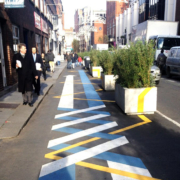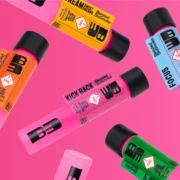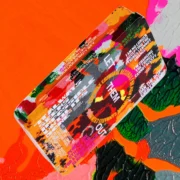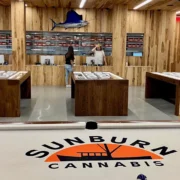
Bíonn siúlach scéalach (walkers have stories to tell)

In the last ten years Cannabis has been legalised in 23 states in the USA and in August recreational use was legalised in Europe’s biggest economy, Germany. This is a potential goldmine for companies. Branding agencies are keen to cater to this. But the brand solutions are no longer tired headshop clichés. The approach is diverse, beautiful, characterful and lifestyle led, giving the plant a new updated image which can appeal to both cannabis enthusiasts and first time buyers. I was interested to see how design studios navigate and create brands that stand out in a marketplace that has become rapidly crowded.
One of the primary jobs a brand has to do for a company is differentiate it … if every cannabis company is trading off of the same tired tropes and cliches, their brands are failing their primary, singular, most important job of differentiation.
Paul Earle Jr., lecturer in entrepreneurship at Northwestern’s Kellogg School of Management
When searching Weedmaps (mainly across America, most brands and dispensary names have some form of the word cannabis, green, high or a nod to health and wellness. It’s lazy branding.
Better brands approach naming and branding from different perspectives and create stories and visuals for their product. This is essential, especially for those like myself who have never dipped their toe into the cannabis world; where do you start, and what’s going to catch your eye? Of course, this is easier said than done.
Cannabis branding spans activism, science, women, and outlaws, offering diverse approaches and backgrounds. Pentagram design studio, a large global design company, has worked on a number of cannabis based brands.
Ben’s Best Blnz (B3) is a cannabis brand designed by Eddie Opara (of Pentagram) and created by Ben Cohen of Ben & Jerry’s. From its concept to its visuals, B3’s aim is to help counter the effect of the war on drugs, especially to those in minority groups who have been disproportionately jailed for cannabis related crimes.

“it advocates for the decarceration of those convicted of nonviolent cannabis crimes, investing 100 per cent of all funds “back into the Black cannabis community and groups advocating for criminal justice reform”, a release states.”
Eddie Opara
This sentiment extends to the visual design, featuring artwork from Dana Robinson and ebony magazine. The packaging features quotes from Nelson Mandela and Angela Davis. The typography is bold and unapologetic, with nods to the civil rights struggle and the Black Panthers.

A completely different approach is the Pentagram work on Sula. A new form of breathable cannabis, designed to make it safer and easier to experience cannabis, especially for first time users. The brand has a friendly demeanour, using gradients and shifting colour to represent the aura of cannabis, the name Sula is a play on the word capsule, the sound evokes a calm and soothing feeling. The brand story is scientifically lead, trustful and friendly, positioning itself as lifestyle and wellness brand to attract the new cannabis user.
Miss Grass is a women focused lifestyle brand which has one goal, normalise the consumption of weed and support women owned weed companies. Their design has poppy colours complemented with neutral tones, a strong editorial look, displaying both elegant and functional typography that is delicious to look at. This, along with stylised illustration curated by the team at Miss Grass, creates a fun, of the moment identity that brings you along for the ride.
But sometimes, shying away from the stigma and controversy that surrounds cannabis, one can miss out on a storied past. One family owned cannabis brand called Sunburn Cannabis in Florida is doing just that. The name ‘Sunburn’ comes from the FBI investigation code named ‘Operation Sunburn’, set up to investigate a group of outlaws who managed to smuggle half a million pounds of Colombian marijuana into Florida (1977) and pocketed $320 million in the process. The brains behind the operation was Bill Cobb, father of current CEO of Sunburn Brady COBB. People love stories, and this embracing of their family history is a great way to get people talking and stand out from the crowd, especially in a busy market like Florida.

In Europe, brands have been taking different approaches in order to reach cannabis enthusiasts as debates continue regarding the legal questions around selling recreational cannabis. But Europe features a number of different ways to sell, brand and create in the cannabis space, from branding, to bespoke smoke ware, coffee-shop and events, it’s about putting your feet in the streets to connect to the audience and make sales.
One Irish company called High Minds is doing just that, working around legal ramifications by selling beautifully designed ceramic smoke ware, which pay homage to Irish craftsmanship and design. Each piece on the site comes with an anecdotal story. The pieces (depicted below) are so gorgeous one could not be blamed for using it for home decoration, which a lot of people do. High Minds also host events with like minded companies to reach their audience, creating exclusive pieces for these events. One such event was held at Hen’s Teeth Dublin last August, which paid homage to the Lord Ha’ Mercy Pipe Long, a stemmed clay pipe that was used at wakes and seen as a political signifier in 20th century Ireland. The pipes were moulded, stamped, and fired in the recently resurrected clay pipe museum in co. Roscommon. The event was a launch party to celebrate the release.
This point of sale activation can be clearly seen as well in European cities such as Amsterdam, where cannabis coffee shops are commonplace. De Kade in Amsterdam, which is one of many of these shops in the city, stands out due to the styling of the interior. Taking inspiration from Art Nouveau, the shop feels both decadent and homely, making it a favourite spot in Amsterdam to enjoy both coffee and cannabis, with word of mouth bringing a wide range of customers to the shop. The well established Dutch brand, Mascotte, sells their branded rolling paper at music festivals and their own special events.

However, I’ll be brief: the emergent legal cannabis industry is growing and adapting, the diverse branding approaches serve as an example to the power of design in reshaping perceptions and driving engagement. Whether driven by activism, science, women’s empowerment, or a nod to the past, cannabis branding is shedding its tired old image and flourishing in a new, vibrant Cannaverse (sorry) that captures the interest of both enthusiasts and newcomers alike.